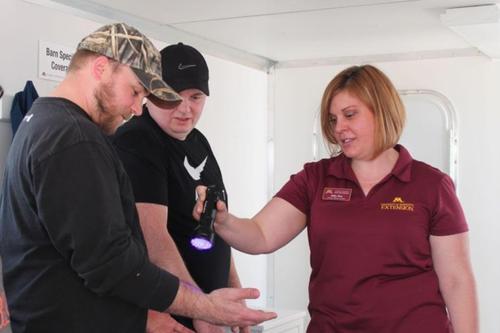
MINNEAPOLIS/ST. PAUL (03/14/2022) — The U.S. Department of Agriculture has been tracking detections of Highly Pathogenic Avian Influenza (HPAI), which could impact Minnesota’s over 500 commercial turkey operations and more than 3,000 poultry farms.
Carol Cardona, a professor in the College of Veterinary Medicine, and Abby Schuft, an Extension educator focused on biosecurity, speak about the impact of HPAI and what Minnesotans could expect in the coming months.
Carol Cardona
“Waiting to act until an influenza case is found in Minnesota is not an option. As soon as those 'wild' birds start to arrive in Minnesota, our producers have to assume they have highly pathogenic AI, so we can't allow them to wait until there’s a case. Poultry producers need to make sure the virus cannot enter their barns by checking the doors and windows every day, multiple times a day.”
Abby Schuft
“Whether it’s in an urban backyard or a large-scale operation, or anything in between, biosecurity depends on everyone involved in raising poultry to follow necessary steps. Now is the time to review protective measures.”
Dr. Carol Cardona is the Pomeroy Chair in Avian Health for the College of Veterinary Medicine. In addition to her expertise in avian influenza, Dr. Cardona is interested in zoonoses (infectious diseases that are transmitted between animals and humans) and the role that poultry play in human health and well being, especially in developing countries.
Abby Schuft is an Extension educator who works with poultry farmers across Minnesota. Based in Willmar, Schuft focuses on applied biosecurity, Danish entry systems and National Poultry Improvement Plan Biosecurity Plan audits. Since joining Extension, she has played a key role in bringing education and technology to farmers using the biosecure entry education trailer, an outreach tool made possible by the state’s Rapid Agricultural Respond Fund following the 2015 HPAI outbreak. She is currently a doctoral candidate at the University, studying biosecurity communications.
-30-
About the College of Veterinary Medicine
The University of Minnesota College of Veterinary Medicine affects the lives of animals and people every day through educational, research, service, and outreach programs. Established in 1947, the University of Minnesota College of Veterinary Medicine is Minnesota’s only veterinary college. Fully accredited, the college has graduated over 4,000 veterinarians and hundreds of scientists. The college is also home to the Veterinary Medical Center, the Veterinary Diagnostic Laboratory, the Leatherdale Equine Center and The Raptor Center. To learn more, visit vetmed.umn.edu.
About “Expert Alert”
University of Minnesota experts can provide commentary, insights and opinions on various news topics. Find selected experts on the University’s Experts Guide or send requests to [email protected].
- Categories:
- Agriculture and Environment
- Animals





